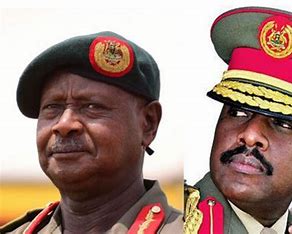
Tyranny of a family: Ugandans belong to Uganda, but politically live under the thumb of Gen Museveni
General Muhoozi Kainerugaba has become a phenomenon on a militarily controlled Ugandan political landscape where only he and his father, General Yoweri Tibuhaburwa Museveni, are unlimitedly accessing the population!
Although Uganda is a multiparty dispensation, leaders of the opposition are traditionally not allowed freedom to express their views before crowds except during elections, which they must lose. If they want to interact with Ugandans, they can only do so by remote-sensing via radios, newspapers and social media. Ugandans may belong to Uganda but politically, they are owned by the family of General Tibuhaburwa Museveni. When they want to interact with the people, the Members of the family are heavily militarily secured against them. All the same the people are given the impression that they have the political freedom to interact before the Members of the family.
It is true that Ugandans have not become collectively politically developed or literate since Independence. Political underdevelopment and political illiteracy have risen supersonically across all social strata during the last 38 years. Mind poverty and income poverty have combined with draconian laws, such as anti-terrorism law, and the excesses of the state, to generate a deep sea of fear and silence – a societal quality needed to create a political environment in which an adroit ruler can manifest himself at the expense of alternative forces.
Although the impression persists that Uganda is a multiparty country, with political organisations such as NRM, DP, UPC, FDC and NUP, except for the ruling party, NRM, the political parties have been rendered almost irrelevant to the power game play of the family of President Tibuhaburwa Museveni. The real political base of the family is not NRM as such but the UPDF and associated paramilitary formations. This is the same as saying that the gun remains the bastion and diatmeor of the political power of the president and his family.
This article is about General Muhoozi Kainerugaba in the context of Uganda and the world. His father has adequately exposed him to the outside world. He has met regional leaders almost in the capacity of president. Recently he travelled with the president to Russia, a member of BRICS (Brazil, Russia, India, China, and South Africa) and interacted with all the African rulers who went to meet Vladimir Putin. Most likely the president introduced his son not only to Putin but also to all the rulers of Africa.
Even before he travelled to Russia with his father, Muhoozi Kainerugaba had publicly expressed his support for Russia in the conflict it is engaged in with Ukraine. Back home he is traversing the country the same way his father does from one presidential election to another, except when he is not in good health.
During his political tours of Uganda, General Muhoozi Kainerugaba is attracting large crowds, sometimes overshooting those his father used to attract soon after dislodging Tito Okello from power on January 25, 1986. The politics of crowds is often exhibited during political electoral contests. However, it does not always follow that the bigger the crowds the bigger the popularity of those involved.
Sometimes small crowds have produced successful candidates. This could mean many things:
- many in the crowds are not registered voters;
- the majority of them vote, the results are twisted to produce a desired candidate;
- crowds don’t matter in elections;
- money has a critical role to play in who wins, and
- vit is the “Independent Electoral Commission that ultimately decides who wins the election.
There are plans to ensure that election of a president in future is done by the Members of Parliament; not by universal suffrage, which has been the case since President Tibuhaburwa Museveni offered himself to the electorate to legitimise his perennial rule.
Therefore, General Muhoozi Kainerugaba is not seeking popularity for votes. He is just meeting the people to be known beyond the army and his family. The huge crowds, like the recent one in Teso, where he was accompanied by the Speaker of Parliament, Among, are achieving the desired result: that the general is or can be as popular as his father in the absence of contrasting political forces.
General Muhoozi Kainerugaba is a serving soldier of Uganda Peoples Defence Forces (UPDF) who has ventured, obviously with the approval of his father, into the murky world of politics while also still ticking as a member of the NRM. We now hear of NRM Muhoozi Kainerugaba and NRM Tibuhaburwa Museveni. This is not exactly like during Obote II when there was UPC Concentrated ( ie, those who thought they were more of UPC than others) and UPC Dilute (those thought to less committed to the party).
The two NRM groups tolerate each other. There is another one called NRM Rwabogo. Therefore, all these do not necessarily contradict each other. It is a three-pronged strategy to keep power within the family of President Tibuhaburwa Museveni.
Political opportunists are projecting General Muhoozi Kainerugaba as a very popular figure on Uganda’s politico-military landscape, second only to President Tibuhaburwa Museveni. They are already referring to him as the Alternative Generator, capable of filling the shoes of his father, General Tibuhaburwa Museveni. The president has usually been oversensitive to suggestions that anyone wants to take his power and authority vested in him by the Constitution of Uganda 1995. He has used maximum force to subdue his opponents while at the same time giving the impression that he is a product of the ballot paper.
With the phenomenon of General Muhoozi Kainerugaba, he has chosen conspiracy of silence. The only time he commented on the phenomenon of his son in Uganda politics, he blamed the leaders of NRM for allowing it to mushroom. He said Muhoozi was exploiting the weaknesses of the Movement. Just that.
President Tibuhaburwa Museveni remains the undisputed chairman of the Movement (NRM). He has organised elections since 1996, not to change leadership, but to demonstrate that he is the most popular politician in Uganda. In the process he has abused the political rights of the majority of Ugandans. He has not allowed the leaders of alternative political organisation to freely access the population the way his son is doing. By allowing his son to exploit the highly controlled political landscape of Uganda, he is abusing the political intelligence and rights of his opponents.
Despite the fact that the quality of life of the absolute majority of Ugandans has plummeted meteorically since 1986 when he captured the instruments of power, elections show his popularity has not been affected; that whatever their condition, Ugandans prefer President Tibuhaburwa Museveni to any other alternatives. It is unlikely that he wants to show that he is ready to surrender his power and authority to any other, even his son. However, he has demonstrated that he is no against hereditary politics. He has promoted a trend in his party whereby daughters and sons have been politically and financially supported to replace their dead parents either as Members of Parliament or LC 5 chairmen. Even if he wanted his son to replace him, he has not publicly shown or declared it. Every day he shows he is in full control.
Meanwhile, General Muhoozi Kainerugaba has not said he wants to remove his father, Tibuhaburwa Museveni, from power. However, he is doing what his father does best: sweet-talking the often poor and needy Ugandans, listening to their problems and giving them the impression that he can solve them. He is making them forget that behind every problem of theirs is the problem of leadership. President Tibuhaburwa Museveni has made too many promises to Ugandans but has not been able to solve even a miniscule of them. Instead, whenever he has tried to solve some, his solutions have become the new problems.
General Muhoozi Kainerugaba may be preparing Ugandans with the complicity of his father, for an ultimate possibility of a hereditary presidency or dynastic rule in Uganda. If this is the case then Uganda is on its way to becoming like a monarchy in the fashion that Babtiste Bokassa converted his poor Central African Republic (CAR) into a kingdom. General Napoleon Bona Parte made himself King of France using Parliament as the legitimising agency.
It would probably farfetched to suggest that President Tibuhaburwa Museveni wants to follow in the footsteps of General Napoleon Bona Parte and Babtiste Bokassa. However, the political environment he has created would not constrain a monarchical presidency. He found Uganda without monarchies of old since Apollo Milton Obote had abolished them. Although he was under pressure to reintroduce them, he resisted and instead reduced the traditional kingdoms to cultural institutions without political power and authority. As such they cannot enforce or reject anything designed at the Centre.
The centre today is the president and state house. Only political events linked to political and economic choices unfolding on the globe may change the political and leadership trajectory in Uganda, not Ugandans who have been entirely conquered and disempowered. In my view, the Muhoozi Kainerugaba phenomenon is not geared towards changing the status quo but entrenching it well beyond President Tibuhaburwa Museveni within the context of a divided world despite the phenomenon of globalisation.
The world is now divided into BRICS-Axis and the West (Euro-American Axis). It is like those days when we had the Soviet bloc and the Western bloc. We had the so-called Non-Aligned countries, but in reality they were not. They are not. They could be so during the day but aligned either to the Soviet bloc or Western bloc at night. They could receive weapons of war from both blocs.
Today Uganda says it is Non-Aligned. It receives weapons from Russia and China but also from the West. In the war between Ukraine and Russia, Uganda, especially General Muhoozi Kainerugaba, has not hidden support for Russia. On the other hand the West-dominated World Bank has announced it is withdrawing loans from Uganda because the country passed an Anti-Homosexuality Act 2023, which they overwhelmingly believe violates the “right” to same sex sexual relationships. Overwhelmingly BRICS abhors homosexuality. Both President Tibuhaburwa Museveni and his son have shown their strong anti-homosexuality attitudes. They have also shown their support for Russia in its armed conflict with Ukraine, which is supported by the West.
There is no doubt that in such a divided world and phenomena of Tibuhaburwa Museveni and Muhoozi Kainerugaba sandwiched between the West and BRICS, but leaning far more towards BRICS, the future of Uganda has never been so uncertain. The joint words and actions of the two men will determine which way Uganda goes. At present, the collective mind of Ugandans cannot guess where the country is going.
For contemporary examples of where Uganda is and where it is going, we may cite the Kim Dynasty in North Korea (DPRK) and that of Cambodia where the 38 year-old dictatorship of Hun Sen handed over power to his son Hun Manet last week! The new Cambodian ruler is the same age as Muhoozi Kainerugaba and has been using the same style of accessing the population.
- A Tell report / By Prof Oweyegha-Afunaduula, a former professor in the Department of Environmental Sciences of the Makerere University, Uganda











